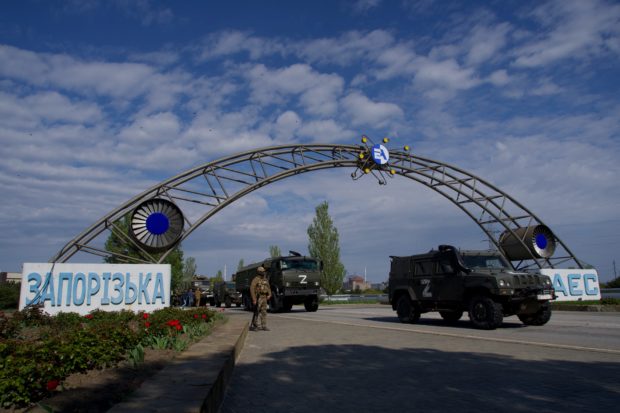Ukrainians decry ‘suffering’ in Russian-controlled areas

Russian military vehicles drive through the gates of the Zaporizhzhia Nuclear Power Station in Energodar on May 1, 2022. AFP
ZAPORIZHZHIA, Ukraine—Ukrainian civilians fleeing Russian-occupied parts of the country allege violence, extortion and theft at the hands of Russian troops, not to mention daily humiliation at checkpoints.
“We suffered and suffered and suffered,” said Igor Kydryavtsev, one of 10 Ukrainians who spoke to AFP about living under Russian control in southern Ukraine’s Kherson region for around two months.
“If you say a single word in Ukrainian and someone hears you and tells them, they come to your house and take you away,” he said.
“Some come back, others don’t. You can’t live like that.”
Kydryavtsev, 35, is with his wife and daughter in Zaporizhzhia, a major southern industrial city still in Ukrainian hands and a gateway for those fleeing the war.
Article continues after this advertisementWith the frontline only a few dozen kilometres away and Russian troops advancing, hundreds of people arrive in Zaporizhzhia every day from Russian-occupied territory, some just passing through, but others to stay.
Article continues after this advertisementAmong them is Natacha Borch who, with her two children, two and six, fled the Orikhiv region, south of Zaporizhzhia.
“They were constantly drunk,” she said, referring to Russian troops.
‘Shot them in the legs’
“They went down the streets shining their torches at windows and sometimes opening fire.”
She said she knew some people taken prisoner in their own cellars, bound hand and foot.
The mother of one of her friends was abducted. “Nobody knows what happened to her.”
She accused the Russians of wanting “money and cars. And if someone wasn’t ready to give their car, they shot them in the legs.”
Several of the people who talked to AFP did so only on condition of anonymity.
None of them referenced anything like the atrocities being investigated in the commuter town of Bucha near Kyiv, where the discovery of bodies in civilian clothes, on the street or buried in shallow graves shocked the world and prompted accusations of war crimes.
“We had a quiet life,” said Kydryavtsev. “Then they arrived and destroyed everything.”
“They take your stuff. They take your cars. They take the crops from the farm workers.”
‘A great many collaborate’
The question of land is particularly sensitive in Ukraine, which before the war was an agricultural giant exporting its crops around the world.
In late April, the prosecutor’s office in Zaporizhzhia accused Russian soldiers of stealing 61 tonnes of corn from the region.
For many of the refugees, checkpoints were the most ubiquitous of the humiliations inflicted by the Russians.
One farmer, speaking on condition of anonymity told AFP that on three occasions he was forced to strip to his underpants after Russian soldiers insisted on checking that he had no pro-Ukraine tattoos.
That was almost standard procedure, said Sergui Pochinok, who with his wife and four children fled Tokmak, a town south of Zaporizhzhia, after it fell to the Russians at the beginning of the invasion.
“We saw people in their underwear at every checkpoint,” he recalled.
Not every Ukrainian got the same treatment, however. For while some endured and some resisted, others simply collaborated with the invaders.
Tokmak had 30,000 inhabitants before the war. “A great many people collaborate with the Russians,” said Olesya Pochinok.
‘Watch out’
She was particularly outraged at one Ukrainian officer, whose job it was to find new recruits. It took him barely two days before he defected to the Russian side, she said.
“The criminals are now working with the Russians,” she said.
“The city is under their protection, they hand out the humanitarian aid”, she said, just leaving it in a heap so people had to fight for their food.
Russia has justified its invasion of Ukraine as a means of stopping Russian-speaking people being oppressed, particularly in the southern and eastern parts of the country where their offensive is now concentrated.
Borch remembers an armoured car parked at the corner of her street.
“People were bringing fruits to the soldiers,” she said, outraged. “There were girls who were giving themselves to them.”
All those who spoke to AFP described empty shops and pharmacies in Russian-controlled territories, as daily goods became unaffordable for anyone on a tight budget.
Sugar tripled in price, said the farmer accusing collaborators of looking to turn a profit.
Of Polohy’s 20,000 inhabitants, around 500 were actively collaborating with the occupiers, he claimed.
“We have a group on Viber,” he said. “Sometimes there is a message with a surname, which says: ‘We know who you are. Watch out.’.”
RELATED STORIES
Putin tells Macron West must stop supplying weapons to Ukraine
Endless petrol queues become point of pride in Ukraine
US hopes to return diplomats to Kyiv by end of month
Pope Francis says wants to go to Moscow to meet Putin over Ukraine—paper